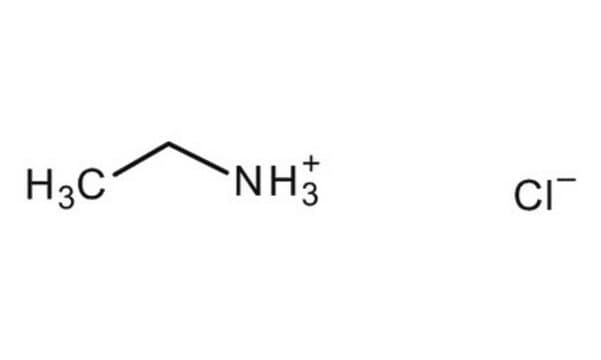All Photos(2)
About This Item
Linear Formula:
(C2H5)2NH · HBr
CAS Number:
Molecular Weight:
154.05
EC Number:
MDL number:
UNSPSC Code:
12352100
PubChem Substance ID:
NACRES:
NA.22
Recommended Products
Assay
98%
mp
218-220 °C (lit.)
SMILES string
Br[H].CCNCC
InChI
1S/C4H11N.BrH/c1-3-5-4-2;/h5H,3-4H2,1-2H3;1H
InChI key
AATGHKSFEUVOPF-UHFFFAOYSA-N
Looking for similar products? Visit Product Comparison Guide
Related Categories
Application
Diethylamine hydrobromide was used in the synthesis of α-bromovinyltrimethylsilane.
Signal Word
Warning
Hazard Statements
Precautionary Statements
Hazard Classifications
Eye Irrit. 2 - Skin Irrit. 2
Storage Class Code
11 - Combustible Solids
WGK
WGK 3
Flash Point(F)
Not applicable
Flash Point(C)
Not applicable
Personal Protective Equipment
dust mask type N95 (US), Eyeshields, Gloves
Certificates of Analysis (COA)
Search for Certificates of Analysis (COA) by entering the products Lot/Batch Number. Lot and Batch Numbers can be found on a product’s label following the words ‘Lot’ or ‘Batch’.
Already Own This Product?
Find documentation for the products that you have recently purchased in the Document Library.
SYNTHESES AND POLYMERIZATION OF α-TRIMETHYLSILYL ACRYLIC MONOMERS.
Canadian Journal of Chemistry, 41(12), 2977- 2982 (1963)
National Toxicology Program technical report series, (566)(566), 1-174 (2011-12-01)
Diethylamine is used mainly as a chemical intermediate to produce the corrosion inhibitor N,N-diethylethanolamine and a lesser amount is used to produce pesticides and insect repellants and in rubber processing. Diethylamine was nominated for study by the National Institute of
Doron Yariv et al.
Colloids and surfaces. B, Biointerfaces, 78(2), 185-192 (2010-04-07)
In this paper we examined feasible correlations between the structure of different lyotropic mesophases and transdermal administration of three diclofenac derivatives with varying degrees of kosmotropic or chaotropic properties, solubilized within the mesophases. It was found that the most chaotropic
Nathalie Hasler-Nguyen et al.
BMC research notes, 5, 321-321 (2012-06-23)
Rubbing a topical NSAID (non steroidal anti-inflammatory drug) on the skin may increase local drug permeation, affecting its distribution to the site of pain and inflammation. The present study evaluates this hypothesis, by assessing in vitro the effect on skin
Jingfeng Chen et al.
Biochimica et biophysica acta, 1807(5), 491-502 (2011-03-17)
Mitochondria-derived oxygen-free radical(s) are important mediators of oxidative cellular injury. It is widely hypothesized that excess NO enhances O(2)(•-) generated by mitochondria under certain pathological conditions. In the mitochondrial electron transport chain, succinate-cytochrome c reductase (SCR) catalyzes the electron transfer
Our team of scientists has experience in all areas of research including Life Science, Material Science, Chemical Synthesis, Chromatography, Analytical and many others.
Contact Technical Service








